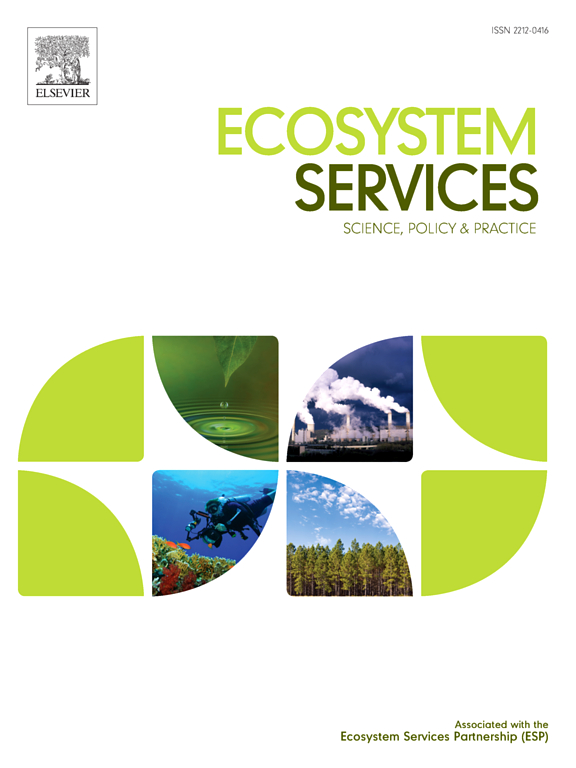绿色高档化推动了从生态系统服务供给到文化评估的社会文化转变
IF 6.6
2区 环境科学与生态学
Q1 ECOLOGY
引用次数: 0
摘要
士绅化影响了生态系统服务的社会分布,影响了生态系统服务的使用、认知和价值,并导致社会生态冲突。这一点在沿海城市地区尤为明显,在那里,依靠ES谋生的当地贫困社区往往因房地产和旅游活动而流离失所。在这里,我们通过一个正在进行的城市转型计划,分析了乌拉圭一个高绅化沿海地区社会经济地位的ES的使用、感知和评估。我们结合了半结构化访谈、参与式观察和绘图,以识别、评估、使用频率、主要压力和ES的权衡。我们证明了不同社会经济地位的社区对ES的不同使用和评估。富裕的社区主要认可文化-休闲ES,在夏季偶尔使用。相反,贫困地区的居民确定了更大范围的可持续能源,全年使用,并且由于他们对基本需求的高度依赖,对提供可持续能源的评估更高。在当地城市管理计划的推动下,加速的中产阶级化可能会加剧ES分配的不平等,并由于高度依赖的贫困居民获得ES的机会有限而引发环境正义问题。这可能会导致ES的使用和评估同质化,倾向于文化娱乐,富裕用户更多地使用和重视。我们强调有必要进行包容性城市规划,承认并整合不同社会经济群体对生态环境的不同价值和依赖,以确保可持续和公平发展,保护当地生计,维护生态完整性。本文章由计算机程序翻译,如有差异,请以英文原文为准。
Green gentrification drives socio-cultural shifts from provisioning to cultural valuation of ecosystem services
Gentrification influences the social distribution of Ecosystem Services (ES) which can affect their use, perception and valuation, and lead to socio-ecological conflicts. This is particularly evident in coastal urban areas, where local underprivileged communities depending on ES for their livelihoods are often displaced due to real estate and tourism activities. Here, we analyse the use, perception and valuation of ES regarding the socio-economic status in a gentrified coastal area in Uruguay with an ongoing plan of urban transformation. We combined semi-structured interviews, participatory observation and mapping, for the identification, valuation, frequency of use, main pressures and trade-offs of ES. We evidenced a contrasting use and valuation of ES between neighbourhoods of different socio-economic status. Affluent neighbourhoods mainly recognized cultural-recreational ES, with sporadic use during summertime. Contrarily, residents of underprivileged areas identified a wider range of ES, used all year long, and had a higher valuation of provisioning ES due to their high dependence for basic needs. Accelerated gentrification, driven by the local urban management plan might exacerbate ES distributive inequities, and raise environmental justice concerns due to the restricted access to ES by the highly reliant underprivileged residents. This might induce a homogenisation in the use and valuation of ES towards cultural-recreational ones, more used and valued by affluent users. We emphasise the need for inclusive urban planning that acknowledges and integrates the diverse values and dependencies on ES across different socio-economic groups, to ensure sustainable and equitable development, preserve local livelihoods, and maintain ecological integrity.
求助全文
通过发布文献求助,成功后即可免费获取论文全文。
去求助
来源期刊

Ecosystem Services
ECOLOGYENVIRONMENTAL SCIENCES&-ENVIRONMENTAL SCIENCES
CiteScore
14.90
自引率
7.90%
发文量
109
期刊介绍:
Ecosystem Services is an international, interdisciplinary journal that is associated with the Ecosystem Services Partnership (ESP). The journal is dedicated to exploring the science, policy, and practice related to ecosystem services, which are the various ways in which ecosystems contribute to human well-being, both directly and indirectly.
Ecosystem Services contributes to the broader goal of ensuring that the benefits of ecosystems are recognized, valued, and sustainably managed for the well-being of current and future generations. The journal serves as a platform for scholars, practitioners, policymakers, and other stakeholders to share their findings and insights, fostering collaboration and innovation in the field of ecosystem services.
 求助内容:
求助内容: 应助结果提醒方式:
应助结果提醒方式:


